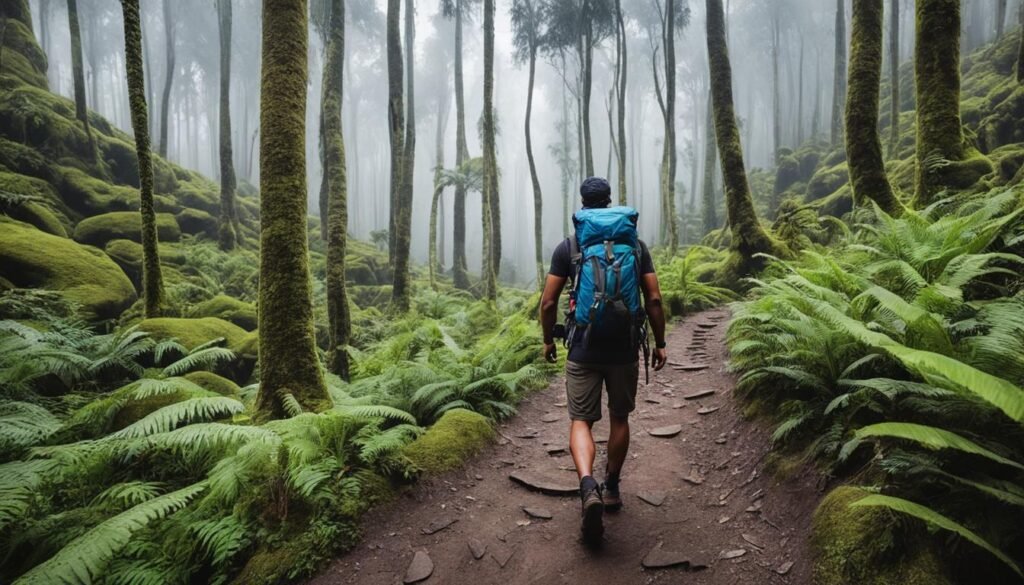Embarking on a backpacking journey through Indonesia can be an exhilarating experience, and your adventure should be memorable for all the right reasons. Whether you’re a seasoned traveler or it’s your first solo expedition, there are vital safety tips for solo backpackers you’ll want to embrace to ensure a trouble-free trip. With careful planning and a clear understanding of Indonesia travel safety, you can immerse yourself in the rich tapestry of Indonesian culture, landscapes, and experiences while maintaining peace of mind.
Indonesia offers an abundant array of experiences, from the dynamic streets of Jakarta to the tranquil beaches of Bali. However, safe backpacking in Indonesia requires a balance of spontaneity and preparation. Awareness is key—knowing the socio-cultural dynamics, recognizing health precautions, and securing your belongings will empower your journey, distancing you from potential hazards. Let’s dive into the indispensable strategies that will shield your sojourn, crafting your Indonesian escapade into a secure and fulfilling tale of adventure.
Key Takeaways
- Pre-trip research is crucial for awareness of local conditions and cultural expectations.
- Understanding the environmental impact and local laws will enhance the safety of your explorations.
- Adopting health precautions for tropical climates can help prevent common traveler illnesses.
- Securing your personal belongings and staying vigilant helps you avoid theft and scams.
- Familiarize yourself with safe transportation options to navigate Indonesia reliably.
- Preparing for emergencies with essential contacts and knowledge can be a lifesaver.
Safety Tips Backpacking Indonesia
Embarking on an Indonesian backpacking adventure means embracing the country’s breathtaking landscapes and cultural richness. Yet, it’s vital to prioritize your safety to ensure a truly rewarding experience. This section provides you with backpacking safety tips, advises on the backpacking safety essentials, and discusses Indonesia travel precautions necessary for a secure journey.
Research Your Destinations
Before setting foot on Indonesian soil, extensive research on your chosen locales is crucial. Information from the tourism board can help you plan trips around the archipelago, ensuring that you’re aware of regional safety advisories, climatic conditions, and access to emergency facilities. Always check the political climate and current events, as these can affect the safety and accessibility of certain areas.
Navigating Indonesian Terrain Responsibly
Indonesia’s tapestry of terrains, from the rolling hills of Flores to the dense rainforests of Borneo, offers a plethora of trekking possibilities. However, responsible travel is key. Always adhere to local guidelines on outdoor activities to leave a minimal environmental footprint and ensure safe navigation through various ecosystems.

Cultural Sensitivity and Awareness
Understanding and respecting local customs can significantly enhance your backpacking journey. Dress conservatively in rural and religious areas, learn basic phrases in Bahasa Indonesia, and always ask permission before taking photos of people. This cultural sensitivity earns you the hospitality and friendship of the Indonesian people, an essential facet of backpacking safety.
| Safety Essentials | Description | Indonesian Use Case |
|---|---|---|
| Emergency Contact Numbers | Local police, hospitals, and embassy contacts | Keep a handy list for immediate access |
| Health Kit | Basic first aid supplies and medication | Crucial for remote areas with limited facilities |
| Respectful Attire | Conservative clothing for temples and villages | Facilitates entry and shows cultural respect |
| Water Purification | Tablets or portable filters | Ensure safe drinking water in the outdoors |
| Offline Maps | GPS-enabled maps accessible offline | Navigation aid where internet is unreliable |
Health Precautions for Tropical Climates
When packing your backpack for the lush and humid environments of Indonesia, prioritizing your health is paramount. As part of your preparation for Indonesia travel safety and essential backpacking safety precautions, a focus on tropical health risks will significantly reduce the potential for illness disrupting your adventure.
Vaccinations: Start by consulting with a travel health specialist about necessary vaccinations. Common recommendations include shots for Hepatitis A and B, Typhoid, and Japanese Encephalitis, among others. Check the Centers for Disease Control and Prevention (CDC) or World Health Organization (WHO) websites for the latest advice, or consult with your local travel clinic.
Mosquito-borne diseases: To protect yourself from mosquito-transmitted diseases such as dengue fever, malaria, and Zika virus, apply a DEET-based insect repellent, wear long sleeves and pants during dawn and dusk, and sleep under a mosquito net, if necessary.
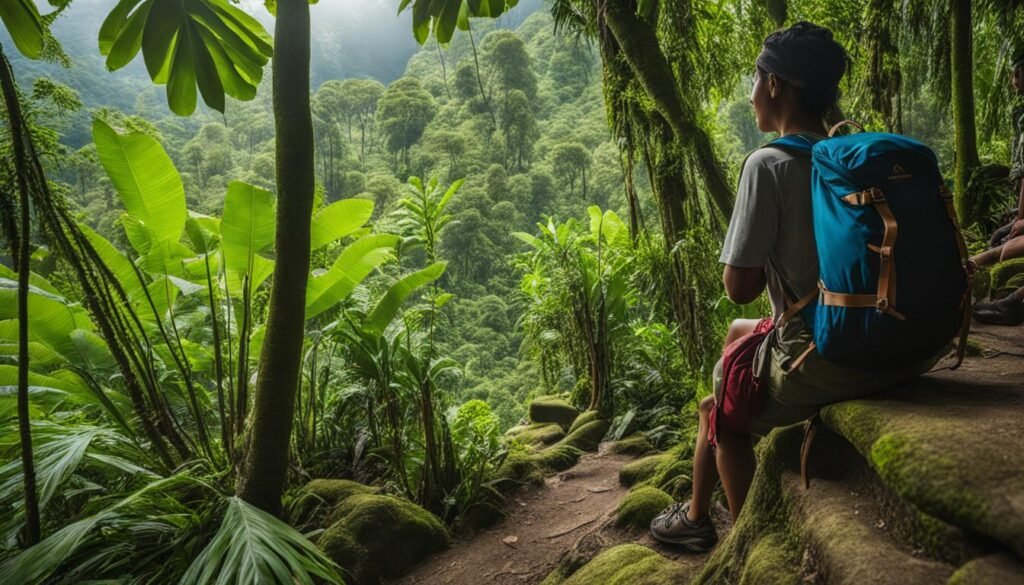
Hydration and Heat: The tropical climate can lead to quick dehydration and heat-related illnesses. Maintain proper hydration by drinking filtered or bottled water, and replenish electrolytes with appropriate beverages. Recognize the signs of heat exhaustion and heatstroke: if you feel dizzy, nauseous, or exceedingly tired, it’s time to rest in the shade, hydrate, and cool down.
| Health Risk | Precaution | Signs & Symptoms |
|---|---|---|
| Dehydration | Drink plenty of fluids, avoid midday sun | Thirst, dark urine, fatigue |
| Mosquito-borne diseases | Use repellent, sleep under nets | Fever, rash, joint pain |
| Heatstroke | Stay hydrated, wear loose clothing | High body temperature, confusion, red skin |
| Foodborne Illness | Eat cooked food, avoid raw salads | Nausea, vomiting, diarrhea |
Kudos for taking on the exhilarating experience of backpacking across Indonesia. By staying vigilant about indonesia travel safety and adhering to backpacking safety precautions, you’re setting the stage for a journey that’s not only thrilling but also responsible and health-conscious.
Securing Your Belongings and Avoiding Scams
When exploring the vibrant landscapes of Indonesia, the security of your belongings and the need to stay vigilant against scams are as important as the adventure itself. By following essential safety advice for backpackers in Indonesia and heeding safety tips for solo backpackers, you can ensure that your journey remains enjoyable and stress-free.
Valuables Management and Theft Prevention
Theft can happen anywhere, but there are practical steps you can take to protect your valuables. Whether staying in a hostel or a luxury resort, take advantage of the facilities provided. Hotel safes are a secure place to store passports, travel documents, and other items of value. When out and about, consider wearing a money belt that stays hidden under your clothing, and always be cognizant of your surroundings, especially in crowded areas.
Common Scams in Indonesia and How to Avoid Them
You might encounter various scams that target travelers, but being informed is your best defense. Be skeptical of unsolicited offers, such as overpriced tours and transport services. If approached by individuals claiming to be officials without a proper uniform or identification, politely decline their services. Understanding common scams helps you avoid falling prey to these deceptive practices.
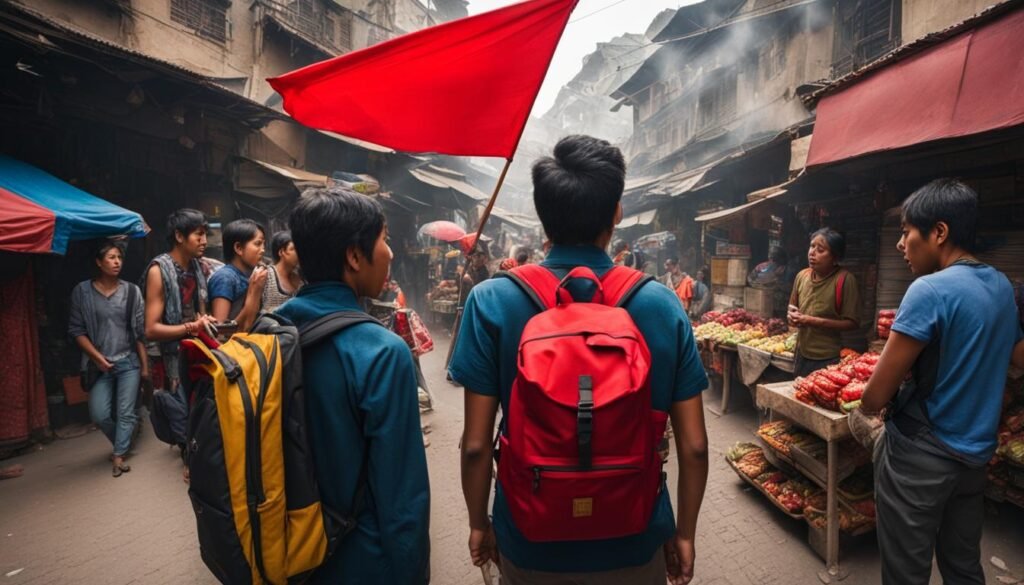
Let’s have a closer look at how to keep your possessions secure and sidestep common scams, ensuring your focus remains on the rich experiences that Indonesia offers.
| Safety Precaution | Description | Tips |
|---|---|---|
| Hotel Safes | A secure place provided by most accommodations. | Always lock your valuables before leaving your room. |
| Money Belts | A discreet way to carry money and important documents. | Wear it under your clothing to keep it out of sight. |
| Awareness in Crowds | Highly populated areas are hotspots for pickpockets. | Keep your bag in front of you and stay alert in busy places. |
| Scam Awareness | Knowledge of common scams is crucial. | Research local scams and don’t be afraid to say no to dubious offers. |
Remember, the key to a successful backpacking experience in Indonesia lies in your preparation and alertness. By keeping your valuables safe and staying informed about the common ploys used by scammers, you’re setting yourself up for an unforgettable adventure without unnecessary setbacks.
Safe Transportation Options in Indonesia
When navigating the lush landscapes and bustling cities of Indonesia, knowing your transportation options is key to maintaining backpacking safety precautions. With a myriad of conveyances at your disposal, each comes with its own set of guidelines to ensure your Indonesia travel safety.
Local buses and city trains offer an affordable and authentic way to see the country, but it’s vital to stay vigilant, especially in crowded conditions. Watch your belongings and familiarize yourself with the routes and schedules to avoid getting lost. If the call of adventure lures you to more remote areas, choosing organized tours with reputable companies adds an extra layer of security and convenience.
For those with a valid motorcycle license, motorbike rentals are a popular way to explore, but they require a high degree of caution. Always wear a helmet, understand local traffic laws, and never ride after dark in rural areas. Additionally, ensure that your rental agreement includes insurance to cover any unexpected incidents.
Ferries connect the myriad of islands in Indonesia but adhere to a different pace and set of protocols. Always confirm the safety standards of the ferry operator, check weather conditions before setting sail, and avoid overloading your belongings for a smoother voyage.
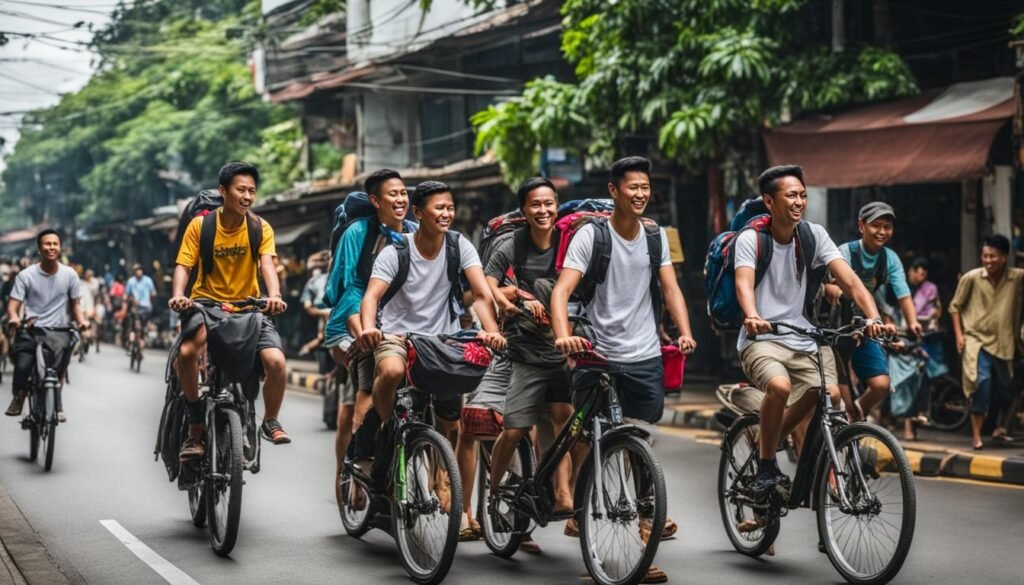
To help you plan your commutes and stay safe, here’s a concise table detailing what you should consider when choosing each transportation mode:
| Transport Type | Safety Tips | Pros | Cons |
|---|---|---|---|
| Local Buses | Stay alert and keep belongings close; learn the routes. | Cheap and reliable | Can be crowded; pickpocketing risk |
| City Trains | Use official booking platforms and avoid rush hours. | Faster travel within cities | Complex networks can be confusing |
| Motorbike Rentals | Always wear a helmet and respect traffic rules. | Flexibility and fun | Risky in heavy traffic or poor road conditions |
| Ferries | Check for operator compliance with safety regulations. | Essential for island hopping | Weather dependent; potential delays |
Remember, while each transportation option in Indonesia has its charm, your safety should never take a back seat. Taking these backpacking safety precautions seriously will ensure that you not only have a remarkable Indonesian adventure but one that is as safe as it is exhilarating.
Emergency Preparedness for Backpackers
Embarking on a backpacking adventure in Indonesia promises an experience filled with diverse cultures, breathtaking landscapes, and the inevitability of the unknown. While you enrich your life with these experiences, it’s crucial to prioritize your safety by prepping for potential emergencies. By understanding emergency preparedness, you can ensure your backpacking journey throughout Indonesia is not only exhilarating but also safe.
Essential Emergency Contacts and Communication
Having access to emergency contacts is vital when navigating the unexpected. Ensure your phone has the necessary functionality to connect with Indonesia’s emergency services. Keep a written list of emergency contacts, including the local police, ambulance services, and your country’s embassy or consulate in Indonesia. It’s also wise to have a communication plan with family or friends back home, to keep them informed of your whereabouts and safety.
- Police – 110
- Ambulance and Rescue Services – 118 or 119
- Fire Department – 113
- Natural Disaster Services – 129
- Embassy or Consulate Contact Information
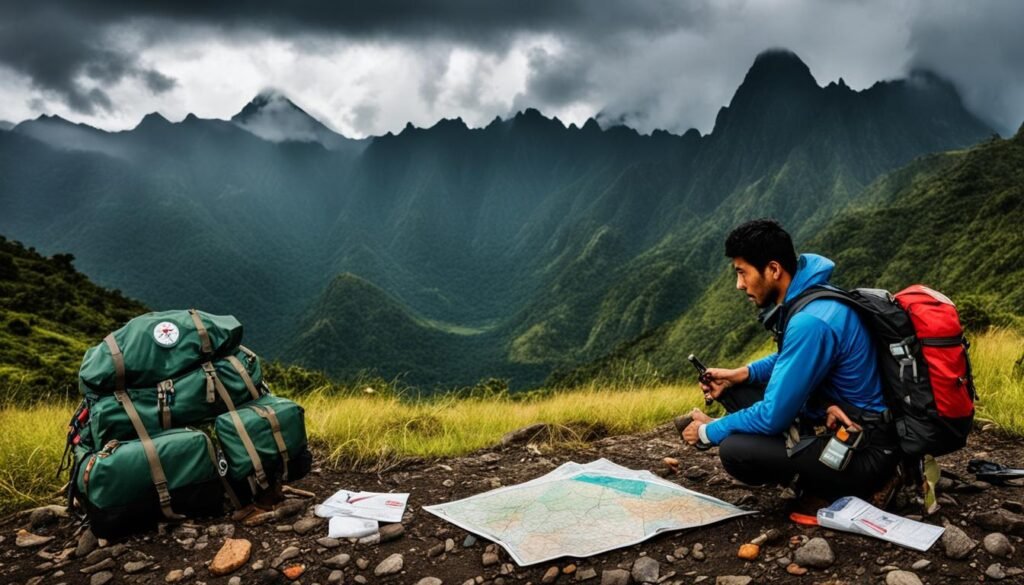
What To Do In Case Of Natural Disasters
Indonesia is prone to natural disasters such as earthquakes, tsunamis, and volcanic eruptions. Familiarize yourself with the recommended procedures if such events occur. Most importantly, stay calm, seek immediate shelter, and follow the instructions of local authorities. Staying informed through local news or an updated weather app is essential for emergency preparedness.
| Disaster Type | Immediate Actions | Post-Event Safety Measures |
|---|---|---|
| Earthquake | Drop, cover, and hold on until shaking stops | Check for aftershocks and move to higher ground in case of tsunami warnings |
| Tsunami | Evacuate to higher ground immediately | Stay informed about updates and return only when authorities declare it safe |
| Volcanic Eruption | Evacuate the area as instructed by emergency services | Wear protective gear against ashfall and avoid river valleys and low-lying areas |
Health Emergencies: First Aid and Accessing Medical Care
In a health emergency, a well-equipped first aid kit can be your first line of defense, particularly for treating minor injuries. Knowing basic first aid techniques, such as CPR and wound care, is invaluable. For more serious medical issues, promptly seek local healthcare services, which can range from clinics in small towns to hospitals in larger cities. Safe backpacking in Indonesia means preparing for the possibility of health concerns and knowing where and how to access medical care during your travels.
- Local Clinics – For minor treatments
- Hospitals – For emergency service and serious health conditions
- Travel Insurance Contact – For support and advice
While exploring the incredible vistas and vibrant culture of Indonesia, staying safe while backpacking in Indonesia is your key to a fulfilling and unforgettable experience. Proper emergency preparedness is not just a precaution; it’s a steppingstone to peace of mind on your journey.
Conclusion
As your Indonesian backpacking adventure beckons, wrapping your mind around all facets of safety is crucial. It’s about blending preparation with practicality; whether it’s diligently researching your destinations or taking health precautions seriously. Keep in mind, extensive knowledge of your journey’s landscape—both in terms of culture and terrain—forms the backbone of a fulfilling travel experience. While embarking on this expedition, safety tips backpacking Indonesia highlight the significance of being proactive with your health, alert in safeguarding your belongings, judicious while choosing transportation options, and astute with emergency preparedness.
Indonesia’s alluring vistas are matched by its complexity, and that’s where indonesia travel safety measures come into play. Your well-being should never take a backseat to the allure of a thrilling escapade. From the bustling streets of Jakarta to the tranquil beaches of Bali, ensure every step is taken with mindfulness—maintaining a delicate balance between thrill and threat.
In essence, secure your adventure’s success by embedding backpacking safety tips into your travel ethos. Let your indelible memories be shaped by the beauty and richness of Indonesian culture—harnessing a trip that’s as safe as it is exciting. With sensible planning and a vigilant mindset, you’ll navigate Indonesia with confidence, making your journey not just memorable, but one where safety stands as your steadfast companion.
FAQ
What should I research before backpacking in Indonesia?
You should research the destinations you plan to visit, including local conditions, weather patterns, and potential health risks. Understanding Indonesia’s geography, such as its volcanoes, jungles, and beaches, is key. It’s also wise to familiarize yourself with cultural norms, dress codes, and social etiquette to ensure respectful interactions.
How can I stay safe while traversing the Indonesian terrain?
Always adhere to local guidelines on outdoor activities and take environmental care seriously. When hiking or exploring, go with a guide if possible, use marked trails, and carry sufficient water and provisions. Preparing for the various landscapes by having the right gear is also critical for safety.
Why is cultural sensitivity important when backpacking through Indonesia?
Being culturally sensitive ensures you respect the local customs and traditions, which can lead to a more authentic and enriching experience. It helps you avoid inadvertently offending locals and can improve mutual understanding. Dressing modestly and behaving appropriately can also increase your safety in unfamiliar areas.
What health precautions should I take before traveling to Indonesia?
Visit a travel clinic for recommended vaccinations well before your trip. Protect yourself against mosquito-borne diseases with repellents and appropriate clothing. Stay hydrated, use sunscreen, and familiarize yourself with the symptoms of tropical illnesses to seek prompt medical attention if needed.
How should I secure my belongings and avoid scams in Indonesia?
Use hotel safes or lockers, wear a money belt or a hidden pouch for valuables, and stay vigilant, especially in crowded places. To avoid scams, be cautious of overly friendly strangers offering deals, verify the identity of any officials requesting payments, and learn the common tricks, like overpriced tours or currency swapping.
What are safe transportation options in Indonesia?
Indonesia offers a range of transportation options, including buses, trains, motorbike rentals, and ferries. Each mode of transport has its own safety considerations; always use official transport services, wear safety gear when required, and avoid traveling late at night in isolated areas. Be particularly cautious if you’re renting vehicles and always check for proper licensing and insurance.
What emergency contacts should I have while backpacking in Indonesia?
Keep a detailed list of emergency contacts, including local police, tourist help lines, and the nearest embassy or consulate. Additionally, have contact information for health facilities and a reliable taxi service. It’s important to know how to communicate in an emergency, so learning a few phrases in Indonesian can be helpful.
How should I respond to natural disasters like earthquakes or tsunamis in Indonesia?
Familiarize yourself with evacuation routes and procedures for natural disasters, which are part of Indonesia’s emergency preparedness recommendations. In the event of an earthquake, protect yourself from falling debris. If a tsunami warning is issued, immediately move to higher ground following the local evacuation signs and instructions.
How do I handle health emergencies while backpacking in Indonesia?
Always keep a basic first aid kit on hand and know how to use it. In case of serious health emergencies, contact the nearest hospital or seek help from the local authorities. It’s advisable to have travel insurance that covers medical treatment and understand the process of accessing healthcare services in Indonesia.

